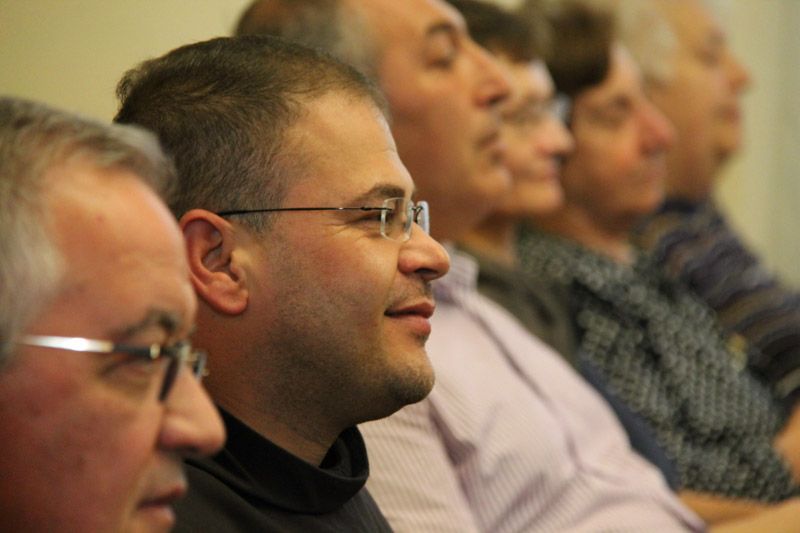There were more than 100 people from different countries, from Piedmont to Apulia, from near and far. What brought them together in Rome on October 21 was the Holy Land. For the tenth consecutive year, the Terra Santa Foundation, together with ATS, wished to organize a day to gather volunteers and associations from all over Italy that support projects and initiatives in the Land of Jesus. This year’s theme for the annual day dedicated to the Holy Land associations was “Subject to every human creature for the love of God. The Franciscan charism at the service of the Holy Land, [a source of richness and a resource] for the whole Church.” During the meetings that took place at the St. Francis Hall of the Antonianum Auditorium in Rome, the important 800th anniversary of Franciscan presence in the Holy Land, which was celebrated a few days prior in Jerusalem, was remembered.
In the morning, Prof. Filippo Sedda spoke about the beginning of the Franciscan Overseas Province in 1217, and Fr. Pietro Messa, spoke about St. Francis’ method. Reflecting on Chapter 16 the Regula Non Bullata (the Rule of St. Francis for non-Christians), he spoke about an important topic for Franciscans, who today live in areas where Christians are in the minority.
In the afternoon, thanks to two strong witnesses, the Holy Land’s hardships and emergencies were discussed in the crowded hall. Vincenzo Bellomo, head of the Franciscan Social Service in Bethlehem, spoke about the Franciscans’ commitment to the Bethlehem parish and the work being done with the children at the Boys’ Home, for example. In order to support the Franciscan-run home that welcomes young men from disadvantaged families, the B4B, or Book for Bethlehem, fundraising campaign, was launched. It is comprised of Christmas stories published by Edizioni Terra Santa, whose proceeds go toward supporting the Boys’ Home.
Fr. Raimondo Girgis, head of the St. Paul Memorial in Damascus, then gave his witness about life in Syria after years of war, particularly focusing on the condition of suffering children, due to violence and poverty.
Then came the time for the dialogue between the various associations that were present, of which there were more than 20 in total. Among them, was an association that sends volunteers to the Holy Land every year (Romano Gelmini), one that handles remote adoptions (Ponte di Pace), one that organizes pilgrimages (Fiore di Nardo), one that gathers young people for trips to the Holy Land (Compagnia San Giorgio), and one that collects disposable sanitary supplies for the medical facility of the Caritas Baby Hospital (Lattine di Solidarietà). In short, small, and even large associations, such as the John Paul II Foundation participated, and thanks to them, the projects and works of the religious in the Holy Land can continue.
“After ten years of this experience, the most important fruit is the friendship between the participants,” said Giuseppe Caffulli, editor of Terra Santa Magazine, who welcomed [all of the associations]. “This is a formative and informative moment about the Holy Land for everyone.” The Bethlehem Angels network, which supports the Baby Caritas Hospital in Bethlehem, came about, for example, at one of these meetings several years ago. “We have a dream to one day coordinate between the various associations involved in the same fields of intervention, and events such as these are opportunities to come together,” said Giuseppe Caffulli.
The Custos of the Holy Land, Fr. Francesco Patton, who came to Rome for the occasion, closed the conference. What does it mean to be a witness to God’s Gospel with one’s life? This was the theme of his lecture, which he developed through concrete stories about the friars in the Holy Land. “To be witnesses to the Gospel with our lives requires that we first welcome the Gospel, that is, Jesus, in our lives,” he said. “Then it requires that in individual concrete situations, we use the peaceful and fraternal style that St. Francis learned from the Gospel.” He brought up the example of the two friars who live in the Orontes Valley, one of the areas that is still under the control of Jabat Al Nusra. They were forced to remove crosses from their churches, and they were often robbed and oppressed, and yet they remained faithful to their baptism and vocation, avoiding getting into conflicts with those who were occupying their homes.
“I invite you to try to see how you can behave in situations without causing any conflicts or disputes,” said Fr. Patton, “putting yourselves in the service of everyone freely, out of love for God, but also with a clear Christian identity. And of course,” concluded the Custos, “with the awareness that our lives do not belong to us, but they are in the hands of the Lord.”
Beatrice Guarrera


